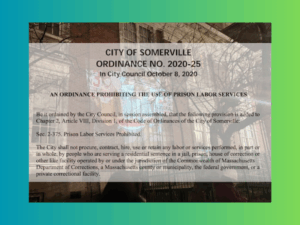The Commonwealth’s most infamous militarized police force continues to flout records law
BY MAYA SHAFFER AND ANDREW QUEMERE
“There’s just a receptionist working there, and she’s afraid of them. They have a camera in her face, and they’re kind of yelling at her, and she doesn’t know what to do.”
So claimed Carlisle Police Chief John Fisher on a call to a Wilmington police dispatcher. Fisher, who is also the president of the Northeastern Massachusetts Law Enforcement Council, or NEMLEC, was reporting that a “group of bloggers” was “harassing” one of NEMLEC’s employees at its Wilmington office. In reality, the “group” Fisher was referring to was only one of us, Maya Shaffer.
“Is it a possibility you could send a police officer to kind of keep the peace?” Fisher asked.
NEMLEC is the largest of several Massachusetts “law enforcement councils,” or LECs, which are 501(c)(3) nonprofit corporations that coordinate regional police activity. Among other functions, NEMLEC has a SWAT team that deploys a BearCat armored vehicle and conducts forced-entry raids on homes throughout the Commonwealth. Maya, on the other hand, was only trying to politely hand-deliver several public records requests at the council’s headquarters in a nondescript office building — no forced entry, no yelling, no harassing. And no group of bloggers either.

NEMLEC became infamous in 2014 after it was revealed that the council was claiming exemption from and refusing to comply with the Massachusetts public records law, which is supposed to keep government agencies transparent by requiring them to furnish documents upon request. After battling it out in court with the American Civil Liberties Union of Massachusetts, NEMLEC publicly agreed to abide by the law. However, judging by our recent experiences, the group is off to a bad start.
Consisting of 59 police departments and two sheriff’s departments in Middlesex and Essex counties, NEMLEC has a board of directors comprised of the heads of those agencies. In theory, police are allowed to form LECs so they can pool their resources and personnel during emergencies and other serious incidents that call for more resources than a single department can manage.
NEMLEC’s mission statement, which was removed from its website last year in response to scrutiny by media and civil liberties groups, explains that the group was founded in the 1960s by eight police chiefs who were trying to address “disorder associated with suburban sprawl as people migrated from larger cities, the development of the interstate highway system, the civil rights movement and the growing resistance to the Vietnam War [all of which] threatened to overwhelm the serenity of the quaint, idyllic New England towns north and west of Boston.”
Since those early days, NEMLEC’s mission has evolved. The “emergencies” NEMLEC now responds to include all sorts of routine aspects of police work. It operates a motorcycle unit, a cybercrimes division, and mobile crime labs, and sometimes even conducts internal affairs investigations for departments in its membership. But the group’s most vexing feature by far is NEMLEC’s massive regional SWAT team.
This SWAT team is what brought NEMLEC to the attention of the ACLU. While investigating the militarization of police in 2012, the ACLU made public records requests to five LECs. “We heard something quite remarkable in response,” said Kade Crockford, director of the Technology for Liberty Project at the ACLU of Massachusetts. “They told us that they are actually private 501(c)(3)s and therefore immune from the public records law. We filed a public records lawsuit. We asked the judge to order NEMLEC to produce the records and to hold that, in fact, NEMLEC is a public agency under the public records law.”
NEMLEC initially fought to get the suit dismissed, but later reached a settlement, after which the council’s Executive Director Laura Nichols said in a statement, “At its core, NEMLEC is a public safety agency, and we hold ourselves to the highest standards of law enforcement.” The outfit’s sole employee at the time, Nichols continued: “I am proud we were able to come together on this matter, because I firmly believe that both organizations have the same desire for safety and openness.”
“It’s the right thing to do,” John Fisher told the Associated Press, adding that the council hoped to hire a second part-time employee to help with record-keeping.
NEMLEC also provided the records that ACLU lawyers requested, and from those documents we learned a bit about the group’s SWAT activity over the past few years. NEMLEC claims its “highly trained and well-equipped” SWAT team exists to respond to “critical incidents,” but the ACLU records showed its forces are frequently used for mundane purposes like serving search warrants in drug investigations.
In one 2013 incident, NEMLEC sent a 35-person army, including 26 of its SWAT “operators,” to smash into a family home with multiple battering rams around 5 am — all so they could arrest two brothers over a few ounces of pot. After wrapping up this so-called “emergency call-out,” NEMLEC posted the address and a picture of the residence on Twitter. On October 31 two years ago, the council dispatched an astonishing 51 people to patrol for drunken Halloween revelers and unspecified “gang related activity” in Salem, and were urged to “maintain a professional demeanor” because “everyone has a camera phone and you don’t want to be on YouTube or the news later.”

As journalists and advocates for the public records law, we were pleased to see that the shroud of secrecy surrounding NEMLEC was beginning to be lifted following the ACLU settlement. But words alone aren’t good enough. We wanted to see if the Commonwealth’s biggest LEC would really follow through on its promise of a new era of openness, so we put its commitment to the test.
To follow the law, agencies must make themselves available in person to members of the public who want to make public records requests. With that in mind, we visited NEMLEC’s office in Wilmington to drop off our requests — that’s when Fisher, the NEMLEC president, called the local police on us. Luckily, we brought a camera along, so the public can see NEMLEC’s transformation for themselves.
What follows is a timeline of our struggle to get NEMLEC to comply with the law:
9.1.15
We drove to NEMLEC’s headquarters in Wilmington, arriving at about 1:55 pm. The office is located on the second floor of an unassuming office building, an amusing contrast with the massive SWAT operations the agency coordinates.
Unfortunately, the office door was locked. And there was no sign with contact information for its records custodian, which is required by state regulations for any agencies that do not keep regular office hours. After striking out, we left a voicemail for NEMLEC using the number on its website in order to figure out a better time to drop by.

9.3.15
NEMLEC’s part-time assistant, Susan Flaherty, returned our call, and Maya explained that she would be turning in our requests. At around 10:30 am, Maya — and, as we said earlier, only Maya — arrived at NEMLEC’s headquarters with a camera rolling and requests in hand.
Flaherty was on the phone when Maya entered. She froze, and silence filled the room. After a brief pause, she hung up the phone. Flaherty, who presumably is the part-time employee hired by NEMLEC to assist with records-keeping, conceded that she was not equipped to handle public records requests. As she put it, “I don’t know anything about [the public records law]. I don’t know any of the rules. I don’t know any of the regulations.” Still, Flaherty agreed to accept the requests, but insisted that Maya change the dates on all of them (since they were dated September 1 from our first attempt).
Maya worked on changing the dates as instructed, but within minutes, Flaherty said she was calling her director, presumably Nichols. Somehow, this call led to John Fisher summoning the Wilmington police to stop the “group of bloggers” that was “harassing” Flaherty. After getting off the phone, Flaherty demanded that Maya leave the office, but Maya remained until she finished changing the dates and was able to submit the requests.
As Maya left, she was surprised to see that the Wilmington police had arrived. Officer Paul Krzeminski approached her car and asked if anyone was still inside the NEMLEC office. Maya explained that she was alone and that — having made her requests — she was now leaving. “Drive safe,” Krzeminski said, then radioed to his supervisor that the conversation had been “pleasant.”
9.8.15
We followed up on Maya’s September 3 visit by drafting a new records request for NEMLEC’s visitor policy. We drove back to the Wilmington office, but arrived around 12:30 pm to find the door was locked again, so we slipped the request under the door.
9.15.15
The Massachusetts public records law requires agencies to respond to requests within 10 days of receiving them.NEMLEC missed the deadline on our first round of requests, so we returned to follow up in person once again, and brought a fresh request for NEMLEC’s incoming and outgoing communications regarding The Bay State Examiner.
We found NEMLEC’s door locked yet again when we arrived at 11:45 am, but the windows were open, and we heard someone moving around in the office through the door. We knocked several times and called out to whoever was inside, but they didn’t answer. When we exited the building, Maya briefly caught a glimpse of someone peeking out the window, presumably checking to see if we were leaving, although we didn’t catch them on video. We called the office’s phone. Whoever was inside didn’t answer.
With the hope that he would intervene, we directly called NEMLEC President Fisher using the number we obtained from a recording of his September 3 call to the Wilmington police, which we obtained through a separate records request to the Wilmington Police Department. Fisher told us NEMLEC would respond to our requests later that day, but was in a hurry to get off the phone, citing a mandatory training conference. He hung up on us without addressing our concerns about being locked out of the office and the absence of a posted sign. We slipped our latest request under the door and left.
Later that day, NEMLEC director Laura Nichols sent us a response by email, telling us we would need to pay more than $1,000 in fees for the records we requested. We also spoke to Fisher again in the evening, and he promised that NEMLEC would put up a sign with contact information within two days.
9.24.15
We returned to NEMLEC’s office at around 10:30 am to pay for some of the records.The door was locked, and no one was inside. Contrary to Fisher’s promise, there was still no sign.
9.29.15
We headed back to NEMLEC’s office at about 11:50 am to find it locked yet again, and there was still no sign. We called Fisher from the hallway outside the office, hoping to arrange a way for us to pay in person. Fisher suggested we mail a check or slip one under the door. We explained that we’d rather get a receipt, but he refused to help us. Over the next few days, we exchanged emails with Laura Nichols and explained to her which records we hoped to pay for.
10.15.15
Having heard nothing new from NEMLEC in some time, we reached out to Nichols for an update. She claimed she was working on preparing the records at that moment.
10.21.15
We received another email from Nichols: “I am working on completing your request by tomorrow.” We asked her when we should arrive to pick up the records, but she didn’t answer.
10.22.15
Despite the lack of a reply from Nichols, we returned to NEMLEC’s headquarters at around 12:20 pm to pick up our records. Once again, the door was locked and the office was empty. NEMLEC had finally put up a sign, but all it included was a phone number. Missing were the name, position, and address of the person who handles records requests, which are required by state regulations. To top it off, the number on the sign was for the landline in its routinely empty office.
We called Fisher again, and he surprised us by saying that our records had already been sent to us. Nichols soon confirmed this in an email: “I mailed a package (an 8 lb box actually) to you today with documents I have been able to gather to date. 11 of the 18 items you requested have been completed.”

Which brings us to where we are now. After nearly two months, seven in-person visits, numerous phone calls and emails, and a run-in with the Wilmington police, we finally received some of the records we requested.
The box we were sent was filled with hundreds of pages of records, including contracts, emails, and more. We even got a copy of an email that Laura Nichols sent to every police chief in NEMLEC in which she made up even more nonsense about Maya’s September 3 visit. “[Maya] was very aggressive, attempted to video paperwork on Susan [Flaherty]’s desk, and insisted that we immediately provide her with records and information about our office,” Nichols claimed.
We’re still waiting for more documents, since Nichols left town for a week after servicing the first round of records. Until then, we have our work cut out for us in taking the deepest look yet at an elusive police force more than half a century in the making. Stay tuned as we continue to hold NEMLEC accountable, and as we reveal more about the history and tactics of its covert operation.









